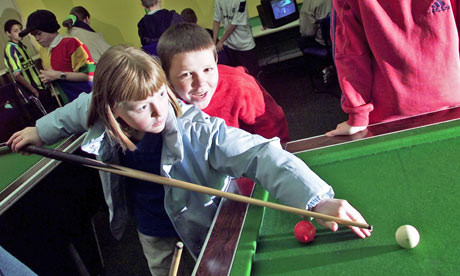
Are you aiming for a career in youth work? Photograph: Christopher Thomond for the Guardian
Traditionally, the youth worker has been a standalone role incorporated into the services offered by local authorities. Now, there is a breadth of jobs and sectors where working with young people plays a dominant role, and where the skills and knowledge of youth workers are in demand; from criminal justice to social care, across the private and voluntary sectors.
Ultimately, all youth work has one key aim – to help young people's emotional and social development in an informal setting but through educational processes. By developing supportive relationships with young people, and opening their eyes to new experiences, youth workers foster increased confidence, ambition and empathy. This prepares them to make a positive contribution to society in adult life. Youth workers tackle a whole spectrum of issues, from behavioural difficulties to teenage pregnancy.
There are essential attributes that all youth workers need – energy, patience and creativity are paramount. And now more than ever, a positive approach to collaboration with other organisations is key. This is especially true in the public sector, where resources are limited and services are being outsourced.
To qualify, youth workers complete a three-year degree in youth work or community studies. The National Youth Agency offers information on accredited courses in England and Wales. Some universities allow students to study part-time, while also undertaking youth work part-time.
But recent changes to the way higher education youth work courses are funded means that places are more expensive, so universities are using increasingly rigorous selection criteria. Ultimately this means youth work is a more competitive education choice.
Anyone considering a career in youth work should identify the kind of organisation they may eventually want to work with – for example, a youth centre, a housing association or a young offenders' organisation – and volunteer or work part-time there. If volunteering is only available on a short term basis then build up a portfolio of experience by spending time with a range of similar organisations. The youth work course is very practical, so relevant experience will equip you with crucial understanding and creative ideas to show off at the interview stage. A distinct vision of where you want your career to go will also show your commitment to youth work.
A day in the life of a youth worker
Kevin Mullins, who won Youth Worker of the Year 2012, works part-time with young people in a high-school-based youth centre in Luton. He says: "A normal working day is a mixture of admin, project planning, facilities management at the youth centre and face-to-face work with young people.
"Typically, my mornings are taken up with preparation for upcoming projects. One of my current projects involves exploring beliefs and values with the school's year 10 group (aged 14-15). I am working with these young people to research and debate arguments for and against abortion and capital punishment. This project aims to raise their awareness of controversial issues and give them the tools to engage in debate while addressing their own feelings on the topics.
"In the afternoons, I often spend time in one-to-one mentoring sessions, listening and advising young people who need additional behavioural support. Inevitably there is admin that requires attention, so I try to catch up on emails before after-school sessions. After school I run sexual healthsessions with years 10 and 11, exploring issues such as sex and the law.
"Being a youth worker is not a nine-to-five job. In the evenings I regularly spend time catching up with young people on issues affecting the local housing estate. At the moment I am delivering workshops on stereotypes and prejudices, establishing where stereotypes originate from and how to challenge them.
"Providing positive, engaging activities and continuing to create opportunities for exploring, addressing and tackling the issues which affect young people makes this a very challenging but incredibly rewarding role."
Fiona Blacke is the chief executive of the National Youth Agency.
This content is brought to you by Guardian Professional. To get more content and advice like this direct to your inbox, sign up for our weekly Careers update.
